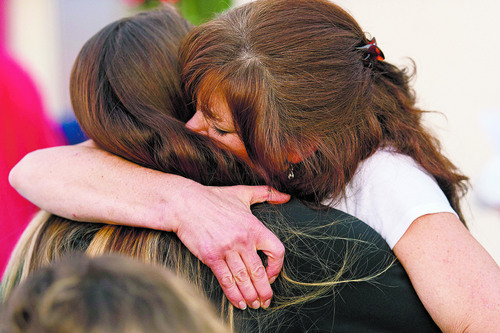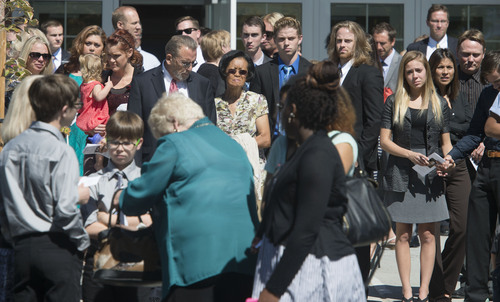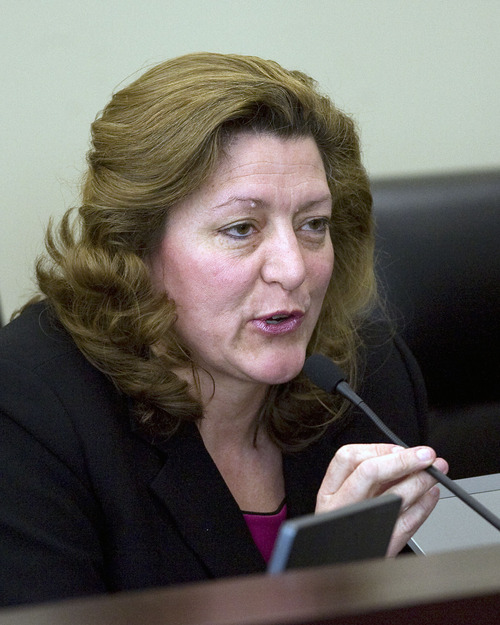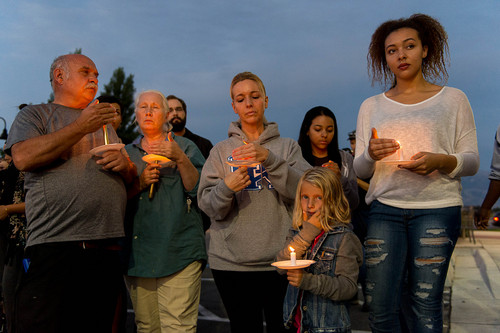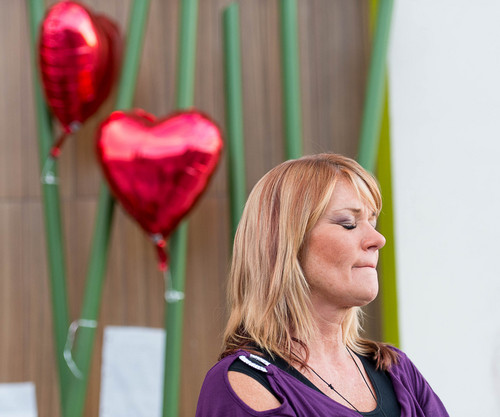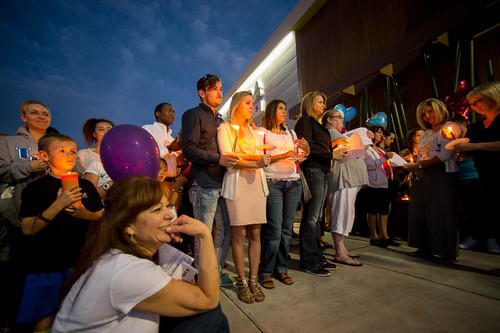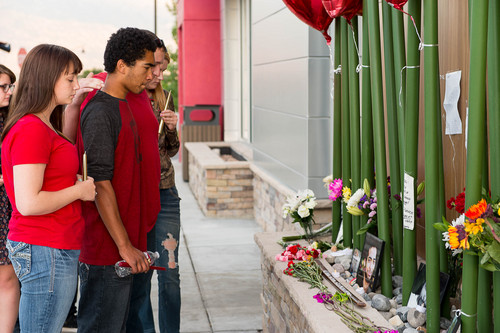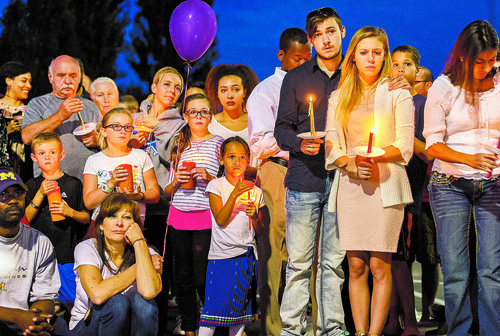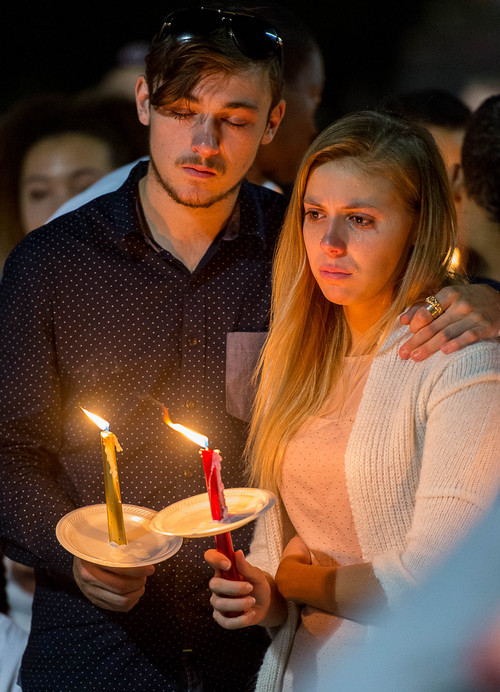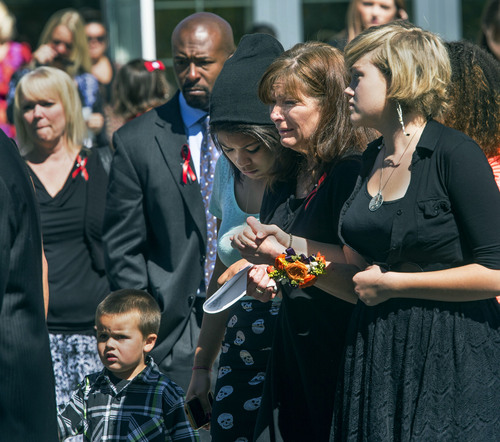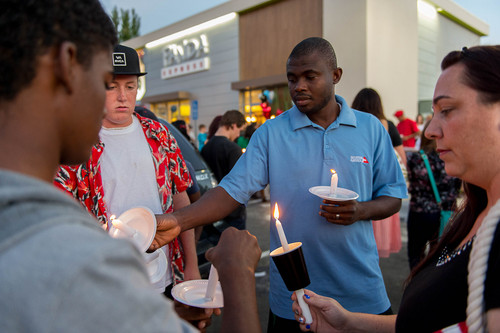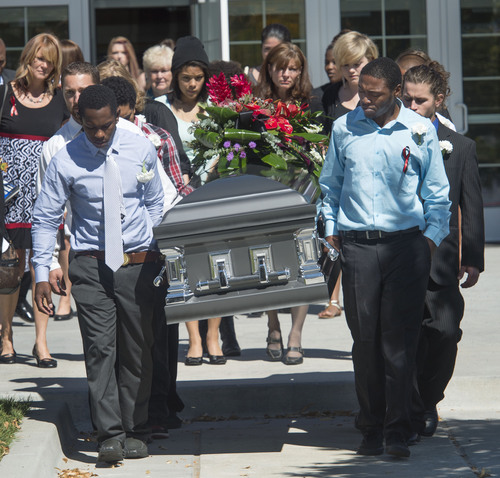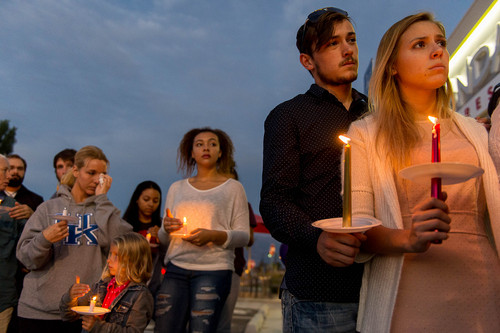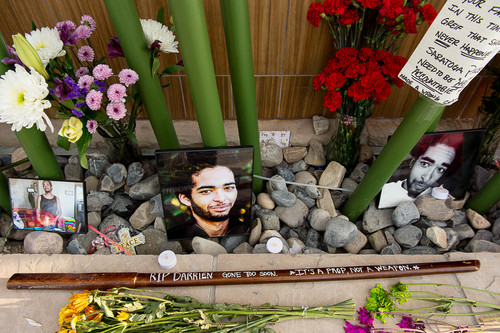This is an archived article that was published on sltrib.com in 2014, and information in the article may be outdated. It is provided only for personal research purposes and may not be reprinted.
Saratoga Springs • "It could have been one of my children."
That is the fear running through many of the state's black and biracial Mormon families in the aftermath of the fatal shooting of Darrien Hunt by police here.
They thought that living in a close-knit LDS community, being known by neighbors and sharing their faith might protect their families from racial assumptions they felt were common in other cities, other places. But now these Latter-day Saints are not confident that is enough.
Hunt's white mother, who is LDS, has charged that her son's black skin was the reason police saw the 22-year-old as a threat and took lethal action against him, while police insist race played no role in the officers' decisions as the young man threatened them with a samurai-type sword.
And, while the investigation continues, some members of The Church of Jesus Christ of Latter-day Saints are taking a hard look at the persistence of racial bias in a faith that in 1978 overturned a ban on black men being ordained to its all-male priesthood and black women from participating in temple rituals.
These black Mormons yearn to address the need for forgiveness and healing of racial prejudices in their congregations and in towns like this sleepy new development that is almost entirely white and largely LDS.
"Darrien's death has had a major impact on me," says Danor Gerald, a Saratoga Springs actor and black Mormon filmmaker. "For me to be raising my children of the same ethnic makeup [biracial parents] as Darrien, in this community with this kind of incident taking place here, really gives me cause for alarm."
Gerald, who is directing and starring in "Heart of Africa," a movie about Mormon missionaries and the culture clash they experience on that continent, thought Saratoga Springs was "the most progressive community in Utah because of electing Mia Love, the first black [woman] mayor in the state."
He felt sure he had chosen the best place for his family, which includes his white wife and three kids, a 7-year-old daughter and 10- and 11- year-old sons.
These days he's not so sure.
Facing realities
Holly Richardson, a Utah County mother, blogger and political conservative, eschews extreme racial assumptions.
She rejects the idea that if you see racism in some police actions, you must be a "cop hater." She also does not see the world as a horrible place to be black, with everyone biased against your skin color.
But Richardson, who has 24 children, including 20 adopted from eight countries, does believe it is time "to have a dialogue about uncomfortable issues."
"We need to honestly reflect as a community if we have inherent biases against people of other countries," says Richardson, a former state representative who blogs as HollyontheHill. "I have a daughter from Guatemala. Will people make assumptions about her being an [undocumented] immigrant? Will they judge her?"
Mormons have "cultural standards and are uncomfortable with people outside the norm," she says, "like someone who has tattoos, or who wears tank tops in the summer."
LDS culture is "not the same as doctrine," Richardson says. "Even though there are church members who have called my sons the N-word, it still doesn't shake my faith."
Like everyone, Mormons "are imperfect human beings," she says, "It's a matter of finding your way, no matter what your skin color, and not to feel entitled or think entitled; just examine your own biases."
Still, as a parent of black sons, Richardson has also had to have "the talk" with them. And it's not about sex.
It's about dealing with authority — she tells her children to be "compliant" and never defiant or threatening when dealing with adults, especially police. "I tell that to all my kids," she says, "but especially my black children."
'Don't call me that'
Richardson's 22-year-old son, Ashenafe Richardson, who was adopted from Ethiopia when he was 10, has learned his lessons well.
"I have had to deal with people calling me the N-word," says Ashenafe Richardson, a student at Southern Utah University in Cedar City. "I give them a warning. I say, 'Don't call me that.' I don't get along with racism. I get pretty defensive and upset. People calling me names because of my skin is not OK."
The young Mormon served a two-year mission for his church in several urban areas of Virginia, where the population was mostly black.
"People gave me a hard time about belonging to a white church," Ashenafe says with a laugh. "But I had a lot of baptisms, especially of people who said they had never seen a black Mormon before."
He thinks race problems in Utah are largely due to ignorance, not overt racism.
"There are not many people of color here," Ashenafe says. "A lot of people who grow up here never leave the state. They only see African Americans or Hispanics on TV, where they are in a gang or something."
When Utahns see a black or Hispanic member who isn't conservatively dressed like many in the Mormon culture, he says, "they assume he is not a good person."
Faith over history
Loki Mulholland knows all about such false assumptions.
Mulholland, a Mormon convert who lives in Lehi, learned firsthand about the struggle for civil rights from his mother, Joan Trumpauer Mulholland, one of the 1960s white Freedom Riders.
Joan Mulholland was one of the white students who sat at a Jackson, Miss., Woolworth's lunch counter for blacks, being spat upon by a crowd of angry townspeople.
Though her Southern parents taught her racial superiority, her Christian beliefs pushed Mulholland to reject such discrimination.
Now her son, who made a documentary about his mother titled "An Ordinary Hero," is bringing that same sensitivity to Utah.
"Do I believe that Darrien Hunt was killed because police officers were overtly racist? No," he says. "But there are unrealized racisms programmed into us. They are part of our DNA that we don't even realize."
He wonders who called the police about Hunt to report the young man was "suspicious."
"Was it really because of the sword or color of his skin?" asks Mulholland, who attended a Sunday night vigil last weekend for the young man. "We need to be honest with ourselves. Do we really believe we are all God's children or does that become distorted when we see the color of someone's skin?"
Unanswered questions
Tamu Smith, a black Mormon mom in Provo, says her children haven't slept well since Hunt's killing.
Smith has decided to ban her boys, ages 11 and 14, from playing "night games," where they run through the neighborhood on a balmy summer evening. And from going with older teens in cars. And from staying out late.
Tamu's husband, Keith Smith, says he now has to worry about what his sons are wearing outside the house.
Here's the reasoning, says Keith Smith, who is white. He fears others are thinking: "If you don't look like me or talk like me or dress like me, I'm gonna call the police."
He adds: "That's not what most kids in most neighborhoods have to worry about. All of a sudden, it is part of your reality."
It's particularly troubling, the Smiths say, when they are members of the same faith as their neighbors, where their children are well-known, and when they hear sermons on loving everyone at church week after week.
So what can be done?
LaShawn Williams-Schultz, an African American therapist and lifelong Mormon who works at Wasatch Family Therapy in Orem, would like to see the police officers express sympathy or grieve with the Hunt family.
Regardless of how the investigation turns out, she says, a mother lost her son.
"I'd love to see an officer reach across to the family and say, 'I am sorry for the pain I caused you,'" says Williams-Schultz, who also teaches African-American history at Salt Lake Community College. "You don't have to believe [the shooting] was about race to mourn with her."
Beyond that, she says, LDS authorities could speak more overtly and often about the sin of judging people by their skin color.
"We can't bring Darrien back but what we can do in his memory?" Williams-Schultz asks. "This is an opportunity for healing in our shared faith."
And maybe, such reconciliation doesn't have to be an exception, or response to one incident, she says, but "the fabric of what we do as Christians."


